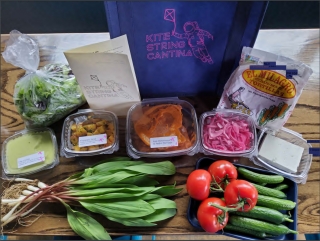
Curated Meal Kits Appeal to Today’s Consumers
Culinary Visions® study explores the allure of meal kits to modern consumers.
Feedback & comments: This email address is being protected from spambots. You need JavaScript enabled to view it.
Research from Culinary Visions® finds consumers are taking a fresh look at meal kits crafted by culinary professionals as part of their regular dining routine. More than 2,000 consumers nationwide provided their opinions about the appeal of modern meal kits that allow them to create restaurant experiences at home.
The new wave of meal kits appeals to consumers who are increasingly enjoying cooking at home and want to indulge their desire for a culinary adventure. In this recent study, 91 percent of those surveyed said they enjoy cooking at home and 76 percent consider themselves to be adventurous eaters. Savvy food marketers and innovative chefs have been developing, updating and fine-tuning their meal kit offerings to meet the demands of value-conscious, well-informed consumers.
Meal kits are becoming a mainstream phenomenon with 49 percent of 18–34-year-old consumers saying meal kits are part of their weekly grocery routine. Meal kits are most appealing to households with three or more people with 49 percent reporting this as a weekly routine.
“After being popularized in northern Europe around 2007, meal kits first entered the U.S. food scene about 10 years ago. They were quick to appeal to higher-income households and trailblazing consumers, yet struggled with value perception and repeat purchases,” said Sharon Olson, executive director of Culinary Visions. “Our new survey points to broader appeal and repeat purchase of meal kits with more than 34 percent of respondents in households earning between $50,000 and $74,000 per year considering meal kits a weekly grocery routine.”
A variety of meal kits appeal to the diverse food interests of today’s consumers. Topping the list of desirable meal kit characteristics are those that have creative collaborations between a restaurant chef and a local farmer, as noted by 72 percent of those surveyed. With 41 percent of participants in this survey reporting that someone in their household has dietary restrictions, sensitivities or allergies, meal kits catering to this group were most appealing to Millennial and Gen X consumers. Seventy-two percent of 18-34-year-old and 65 percent of 35-54-year-old respondents said they would be interested in a meal kit that catered to specific dietary needs that were important to them.
Tuning into constantly evolving consumer desires is crucial to success for meal kit providers. According to Renee Ragin, chef and co-owner of Chicago’s Kite Food Club, “Staying in touch with our customers and our supplier partners allows us to update our offerings to appeal to our customers’ continuously evolving new-normal food lifestyles.”
Customer service and support often goes beyond the box with educational tools to assure successful home preparation. Unlike fully prepared to-go meals, meal kits require customers to have basic cooking skills. Although how-to tutorials inside are appreciated, 68 percent of those surveyed said they would enjoy a video tutorial from a chef to accompany the box of ingredients.
First-generation meal kits were delivered, and the past few years have embedded delivery as a regular aspect of everyday life. Consumers are now venturing out more to restaurants and are more willing to pick up items rather than relying on delivery for all their food needs. This new study found 71 percent of consumers are interested in a box of ingredients and prepared sauces to take out from a restaurant. The mini marketplace or retail food boutique is popping up in restaurants across the country providing consumers with more and more choices for their dining pleasures.
Photo courtesy of Culinary Visions Panel. Kite Food Club Spring 2022 Meal Kit features ingredients for tacos al pastor with locally foraged ramps, local greenhouse tomatoes and cucumbers, and salad greens.
